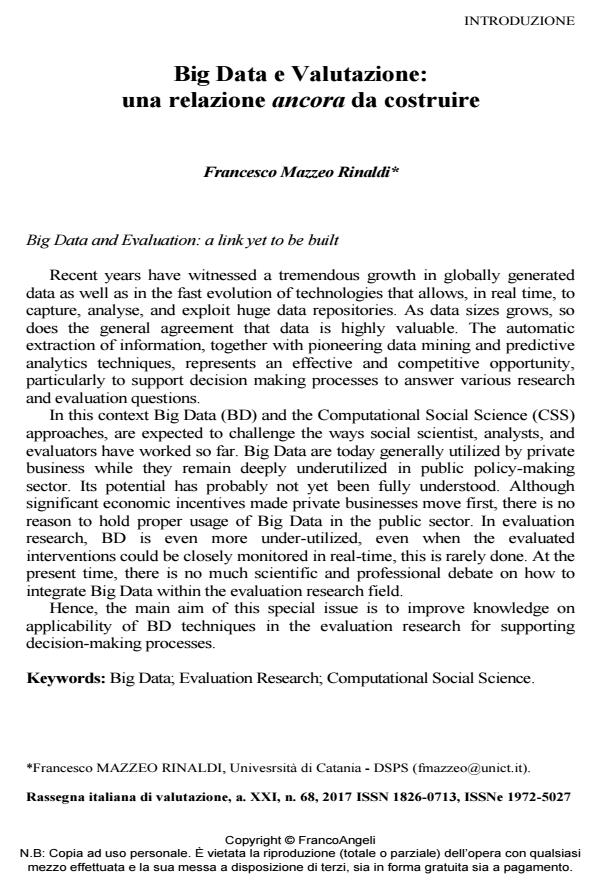Big Data e Valutazione: una relazione ancora da costruire
Titolo Rivista RIV Rassegna Italiana di Valutazione
Autori/Curatori Francesco Mazzeo Rinaldi
Anno di pubblicazione 2018 Fascicolo 2017/68
Lingua Italiano Numero pagine 19 P. 7-25 Dimensione file 415 KB
DOI 10.3280/RIV2017-068002
Il DOI è il codice a barre della proprietà intellettuale: per saperne di più
clicca qui
Qui sotto puoi vedere in anteprima la prima pagina di questo articolo.
Se questo articolo ti interessa, lo puoi acquistare (e scaricare in formato pdf) seguendo le facili indicazioni per acquistare il download credit. Acquista Download Credits per scaricare questo Articolo in formato PDF

FrancoAngeli è membro della Publishers International Linking Association, Inc (PILA)associazione indipendente e non profit per facilitare (attraverso i servizi tecnologici implementati da CrossRef.org) l’accesso degli studiosi ai contenuti digitali nelle pubblicazioni professionali e scientifiche
Recent years have witnessed a tremendous growth in globally generated data as well as in the fast evolution of technologies that allows, in real time, to capture, analyse, and exploit huge data repositories. As data sizes grows, so does the general agreement that data is highly valuable. The automatic extraction of information, together with pioneering data mining and predictive analytics techniques, represents an effective and competitive opportunity, particularly to support decision making processes to answer various research and evaluation questions. In this context Big Data (BD) and the Computational Social Science (CSS) approaches, are expected to challenge the ways social scientist, analysts, and evaluators have worked so far. Big Data are today generally utilized by private business while they remain deeply underutilized in public policy-making sector. Its potential has probably not yet been fully understood. Although significant economic incentives made private businesses move first, there is no reason to hold proper usage of Big Data in the public sector. In evaluation research, BD is even more under-utilized, even when the evaluated interventions could be closely monitored in real-time, this is rarely done. At the present time, there is no much scientific and professional debate on how to integrate Big Data within the evaluation research field. Hence, the main aim of this special issue is to improve knowledge on applicability of BD techniques in the evaluation research for supporting decision-making processes.
Parole chiave:Big Data; Evaluation Research; Computational Social Science.
- L'Agenda Digitale Europea: il punto sulle strategie e gli investimenti nel campo della valutazione Ida Cortoni, Valeria Pandolfini, in RIV Rassegna Italiana di Valutazione 85/2024 pp.145
DOI: 10.3280/RIV2023-085008
Francesco Mazzeo Rinaldi, Big Data e Valutazione: una relazione ancora da costruire in "RIV Rassegna Italiana di Valutazione" 68/2017, pp 7-25, DOI: 10.3280/RIV2017-068002